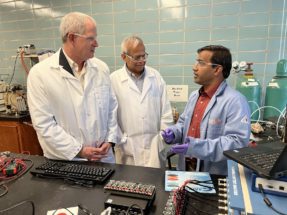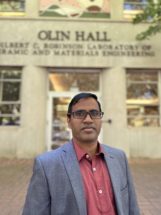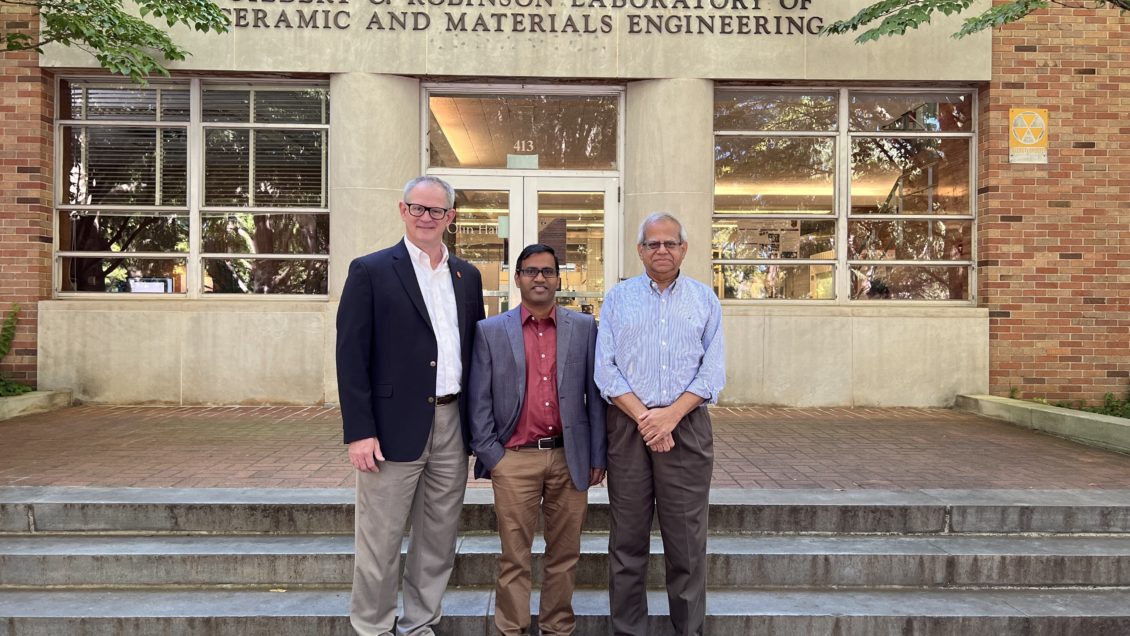A researcher who has specialized in various solar cells and lithium-ion batteries and has begun leaving his mark on higher education around the world won this year’s Clemson University Distinguished Postdoctoral Award.
Dillip Panda received the award for his work as a postdoctoral fellow at Clemson. He recently transitioned to a new role as an assistant research professor in Clemson’s Department of Materials Science and Engineering.

The award recognizes outstanding performance in scientific research, leadership, advocacy, outreach, and teaching.
“This award is an honor, and I thank my advisors and all who have supported me throughout my academic career,” Panda said. “During my postdoc appointment, I had the opportunity to broaden my vision of academic research, develop new skill sets, outline my research goals, coordinate a lecture series, mentor students and serve two terms as president of the Clemson Postdoctoral Association. Clemson is a place where I can grow more and more, and I’m still learning.”
Panda was co-advised by Rajendra Bordia, the George J. Bishop, III Endowed Chair in Ceramic and Materials Engineering, and Stephen Creager, professor of chemistry and associate dean in the College of Science.
“Dillip is a pleasure to work with in every way,” Bordia and Creager said in a joint statement. “He’s a creative and productive scientist, a good student mentor, and a leader who does not wait to be told what to do. His leadership of the Clemson University Postdoctoral Association has helped that group fulfill its mission of bringing together and advocating for postdocs at Clemson. He has broad interests and is a very hard worker, and we are happy to have the opportunity to work with him in our research projects.”
In his research, Panda has been developing various strategies to address the challenge of low power in all-solid-state lithium batteries that can be operated at high temperatures. It could mean that a flammable liquid in batteries could be replaced with a safer material, he said.

Panda’s long-term goal is to translate the technology he is developing from lab-scale batteries to large-scale industrial batteries.
Among his collaborators at Clemson is Apparao Rao, the R.A. Bowen Professor of Physics.
“Dr. Panda is very well trained in all aspects of electrochemistry, and I am pleased to mention that he leveraged his skill set to make significant contributions in the fields of interface science, chemistry and energy,” Rao said. “He is primed for leading his own research program.”
Panda has published 29 high impact factor research papers in his career, including 16 since his March 2017 arrival at Clemson. One paper made the cover of Applied Materials & Interfaces, a journal published by the American Chemical Society. Panda has 800 Google Scholar citations.
Panda received a Master of Science in chemistry from India’s National Institute of Technology Rourkela and a Ph.D. in chemistry from Australia’s University of Wollongong, where he studied under Gordon G Wallace. He held postdoctoral positions at Florida State University and the University of Michigan, where he studied under Bart Bartlett, before his arrival at Clemson.
Prior to his current research, Panda has worked on other projects focused on solar cells, metal-organic frameworks, ionic-conductors, lithium-sulfur batteries, various nanomaterials and sensors. He studied under Sourav Saha, an associate professor of chemistry at Clemson, before he was co-advised by Bordia and Creagar.
Panda lives in Clemson with his wife, Shelly, their 10-year-old daughter, Dibya, and 3-year-old son, Sandeep. Panda is the youngest son of his father, the late Jagneswar Panda, and his mother, Padmavati. Panda’s English teacher, Rabindra Pradhan, and his elder sister Sabita, who taught both math and science to him, had a significant influence on his academic career.
“My parents, brothers and sisters, and relatives, all teachers, and my friends and colleagues have contributed greatly to this wonderful academic journey,” Panda said. “In honor of my father, the late Jagneswar Panda, and father-in-law, Kumar Chakrabartty, both of whom I miss very much, I dedicate this award to them.”
Kyle Brinkman, chair of the Department of Materials Science and Engineering, said that Panda is highly deserving of the Distinguished Postdoctoral Award.
“Dr. Panda has built a reputation as a highly productive self-starter, research mentor and committed leader,” Brinkman said. “I offer him my sincerest congratulations, and I am pleased he decided to stay at Clemson as an assistant research professor. He is well-positioned to support Clemson’s mission as a Carnegie R1 University.”
Get in touch and we will connect you with the author or another expert.
Or email us at news@clemson.edu

